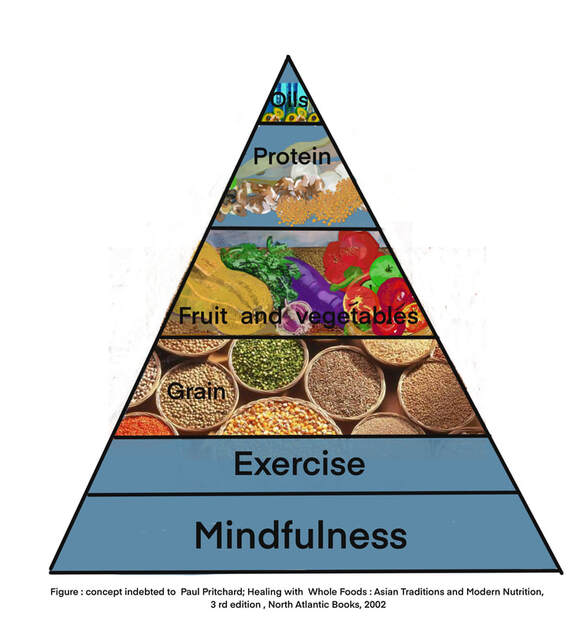NUTRITIOUSANDNICE.COM
The Body can been seen as a Homeodynamic System. That is a system in a constant stage of change, adapting to the ever changing internal and external environments. It aim is to achieve a healthy functional state. Exploring this further, it is useful to think of the body as a number of functional systems. They are not discrete but interact. A disequilibrium in one may impact on the body as a whole. Factors that can influence this system include; the genetic makeup of the person, the internal and external environments which may produce toxins, the nutritional quality of the foods digested, and mind-body interactions.
Hippocrates defined health as, 'an expression of the harmonious balance between various components of man's nature, the environment, and ways of life.' Working from this paradigm, nutritional advice would take into account; the individual needs of the person, including; lifestyle, environment, age, gender, and present state of health. Therefore any therapeutic intervention would need to take into account all of these factors.
Any therapeutic intervention would need to support individual needs. Involving not just nutritional support but that of helping the individual understand the processes involved in the presenting condition, and seeing nutrition as a vital part of overall health, which is supported by other practices such as mindfulness and exercise. Nutritional advice should not been seen as a prescriptive practice but an educational and collaborative one.
Hippocrates defined health as, 'an expression of the harmonious balance between various components of man's nature, the environment, and ways of life.' Working from this paradigm, nutritional advice would take into account; the individual needs of the person, including; lifestyle, environment, age, gender, and present state of health. Therefore any therapeutic intervention would need to take into account all of these factors.
Any therapeutic intervention would need to support individual needs. Involving not just nutritional support but that of helping the individual understand the processes involved in the presenting condition, and seeing nutrition as a vital part of overall health, which is supported by other practices such as mindfulness and exercise. Nutritional advice should not been seen as a prescriptive practice but an educational and collaborative one.
The Foods We Eat

There are a a number of factors that contribute to a healthy body. Macronutrients in the form of Carbohydrates, Protein and Fats, Micronutrients such as vitamins and minerals, and Phytonutrients obtained from plants. Microflora found in the digestive tract has also shown to play a significant role in overall health. Sufficient exercise also contributes a great deal towards optimum health, alongside adequate rest and a mindful approach towards the foods one eats.
There are other significant factors that have an influence upon ones diet. Cultural, religious and ethical concerns play an important role in the types of foods eaten or avoided. But often foods are consumed without a great deal of thought as regards their main constituents.
There are occasions when one is forced to reflect upon ones diet. For example the diet may have impacted significantly upon ones health, as can be found in food intolerances or allergies. The diet may be lacking in certain essential nutrients, for example Anaemia. Or one may have become conscious of the need to lose weight due to health concerns.
Culturally we are all bombarded with information regarding the health benefits of different foods. There are numerous books advocating a particular. ‘Experts’ may write about the benefits of a particular macronutrient over another, or make other claims regarding specific nutrients. The information can become overwhelming as well as contradictory. Often one is at a loss as regards where to begin when thinking of one’s own diet and overall health.
I feel it would be beneficial to begin with what I will refer to as the Energetics of food. That is its ability to provide energy and to maintain the body’s functioning. That is, to satisfy the body’s needs; physically, mentally and emotionally. Understanding the food one eats begins with being mindful.
There are other significant factors that have an influence upon ones diet. Cultural, religious and ethical concerns play an important role in the types of foods eaten or avoided. But often foods are consumed without a great deal of thought as regards their main constituents.
There are occasions when one is forced to reflect upon ones diet. For example the diet may have impacted significantly upon ones health, as can be found in food intolerances or allergies. The diet may be lacking in certain essential nutrients, for example Anaemia. Or one may have become conscious of the need to lose weight due to health concerns.
Culturally we are all bombarded with information regarding the health benefits of different foods. There are numerous books advocating a particular. ‘Experts’ may write about the benefits of a particular macronutrient over another, or make other claims regarding specific nutrients. The information can become overwhelming as well as contradictory. Often one is at a loss as regards where to begin when thinking of one’s own diet and overall health.
I feel it would be beneficial to begin with what I will refer to as the Energetics of food. That is its ability to provide energy and to maintain the body’s functioning. That is, to satisfy the body’s needs; physically, mentally and emotionally. Understanding the food one eats begins with being mindful.
This site is administered by Richard Dykes, a qualified Nutritionist. Trained at the College of Naturopathic Medicine, London.I have a Masters degree in Psychology, and a qualified teacher. Also a practicing artist. All images, unless stated otherwise, have been produced by Richard Dykes. While the information contained within this site is applicable to all diets, an emphasis given towards a Plant Based Diet.
